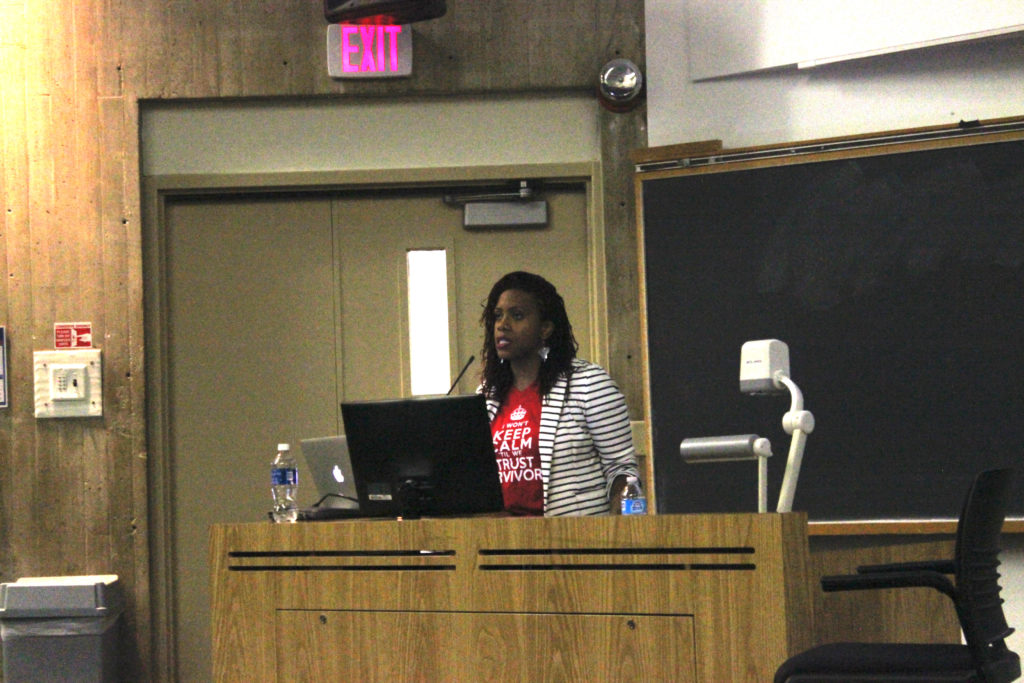
NUNET CLITANDRE
Special to The Leader
Wagatwe Wanjuki, a prominent feminist and anti-rape figure, came to Fredonia on March 30, closing out Women’s History Month to talk to students about rape culture in President Donald Trump’s America. She wore a red t-shirt with the words “I Won’t Keep Calm ‘Till We Trust Survivors,” setting the tone for the lecture she gave that night.
Wanjuki is a highly sought-out speaker and writer who is best known for her work as an anti-violence activist. She is the founder of the anti-rape organization Survivors Eradicating Rape Culture as well as the founding co-organizer of the ED Act Now campaign from Know Your IX. Her speeches and works have appeared on many accredited outlets such as Essence Magazine, MSNBC and the New York Times.
The term “rape culture” was coined during the second-wave feminism movement that occurred in the 1970s. The concept of what exactly a rape culture is was designed to expose the ways in which society blamed victims of sexual assault and normalized male sexual violence.
Wanjuki went on to explain how rape culture rears its ugly head in American society. Examples of rape culture that are seen on a regular basis include victim-blaming, where people blame the victim of rape for their assault, and elementary schools forcing young girls to conform to sexist dress codes. This action tells girls that their developing bodies are a distraction to male students and should be covered to accommodate them because “boys will be boys.” A notion to which Wanjuki responded, “No, boys will be respectful human beings if you raise them properly.”
Wanjuki made the point that our current president or, as she refers to him, the “Cheeto-in-chief” was recorded bragging in vulgar terms about kissing, groping and trying to have sex with women, referring to the leaked “Access Hollywood” footage controversy last fall.
“The fact that we elected this man even after he said all of these stupid things really says a lot about how much America has normalized rape culture,” Wanjuki said.
Wanjuki herself is a survivor who was academically dismissed from Tufts University because her grades plummeted after she reported being sexual abused by her boyfriend. Wanjuki states that the primary issue that came along with her reporting her assault to the Tufts administration is that they didn’t take it as seriously as they should have.
According to her, the Tufts administration told Wanjuki that the circumstances surrounding her abuse made it difficult for them to act.
“They did next to nothing to help me. They told me, ‘Well, you two were in a relationship. There’s a lot to this situation that we don’t know.’ It’s excruciating to not be believed or taken seriously especially when talking about something as difficult as this,” she said.
Wanjuki said that she feels her intersectional identity as an African-American woman probably played a role in the way the Tufts administration treated her.
“I’m statistically less likely to be believed or helped after reporting sexual assault. Some identities are just worse off in America than others. It unfortunate that we as a country still behave like this,” she said.
At the 2016 Academy Awards, Lady Gaga gave an emotional performance of “Til It Happens To You” alongside dozens of survivors of sexual abuse. One of the survivors who accompanied Gaga on stage was Wanjuki.
“We all formed this unique bond through the process leading up to the show, so we all got matching tattoos after it was over,” said Wanjuki.
Student reaction to the lecture was positive. Some students said that the lecture made them think about how Fredonia deals with such a touchy subject.
Junior music industry major Sydney Flanagan said she notices that much of the effort and change that Fredonia has made in regards to the way sexual assault is perceived and handled has been very student and state-driven.
“It’s a bit discouraging. There’s only so many things the campus administration can do legally, which sucks. Students and other individuals have a lot of power that they don’t realize they have,” said Flanagan.
When asked how she thought the current administration could help the anti-rape movement on college campuses, junior political science major Kat Stroh said that taking the initiative to educate students on the process of reporting a sexual assault would be highly beneficial for victims who don’t know how to reach out for help.
“Victims will feel a lot less stuck and helpless if we educate them on how to report rape. It takes lots of fear and anxiety out of the process,” said Stroh.
Some students commented on how helpful and reaffirming it was to see such a successful person who has overcome sexual assault in a proactive way come and give advice on how to move forward in life after such a traumatic event happens. Junior social work major Anneliese Bienko said that “it gives the survivors on this campus a lot of hope.”
At the end of her lecture, Wanjuki was asked by a member of the audience if she was optimistic about the efforts made to shift the way America perceives rape.
“Unfortunately, I’m not very optimistic,” Wanjuki responded. “I don’t think America will see a notable change in the current generation’s lifetime. I feel our current administration has significantly set us back on our endeavors to reach justice for victims.”
